trenches
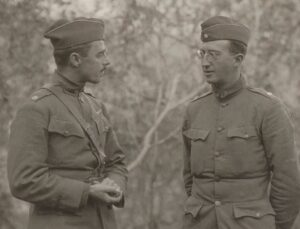
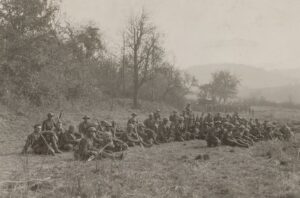 Today is a very important day. It is not about having a three-day weekend, a barbecue, picnic, or even a holiday camping trip. It’s not that these things are bad, or even wrong. It’s really just a matter of remembering and showing respect for those men and women who went to war and didn’t come home alive. Those men and women gave their all, their very lives to keep us and so many others around the world safe. They could have stayed home. There isn’t a draft anymore, although many were drafted, because in a war the likes of the world wars, and others, the men and women were dying so fast that the volunteers couldn’t keep up. So, they held a draft, and those men, because at that time women weren’t drafted, did their duty, and went to fight the war, many losing their lives in the process.
Today is a very important day. It is not about having a three-day weekend, a barbecue, picnic, or even a holiday camping trip. It’s not that these things are bad, or even wrong. It’s really just a matter of remembering and showing respect for those men and women who went to war and didn’t come home alive. Those men and women gave their all, their very lives to keep us and so many others around the world safe. They could have stayed home. There isn’t a draft anymore, although many were drafted, because in a war the likes of the world wars, and others, the men and women were dying so fast that the volunteers couldn’t keep up. So, they held a draft, and those men, because at that time women weren’t drafted, did their duty, and went to fight the war, many losing their lives in the process.
I happened to watch a movie the other night, called “The Lost Battalion.” It was a true event from World War I. It was called “The Lost Battalion” because of the heavy losses incurred by the nine companies of the US 77th Division of roughly 554 men, who were isolated by German forces during World War I after an American attack in the Argonne Forest in October 1918. Of the 554 men, roughly 197 were killed in action and approximately 150 missing or taken prisoner before the 194 remaining men were rescued. These men were not lost. The US Army knew where they were…pretty much, but they were lost, because it was expected that all would be lost, and that was almost the case. During the battle, the men had to leave the trenches and run, almost completely unprotected at the Germans entrenched on the other side of the hill. The battle was gruesome, and the movie was quite graphic. I’m sure many people would say that they shouldn’t have shown so much blood and mutilation, but if they “sugar coat” it, do we really understand how horrible war is?
The battalion was led by Major Charles W Whittlesey who survived the attack, but refused to be transported out ahead of his men, choosing instead to walk out with them. When the attack began in the Argonne, the 77th Division was under the belief that French forces were supporting their left flank and two American units including the 92nd Infantry Division were supporting their right. Within the 77th sector, some units, including Whittlesey’s 308th Infantry, were making significant headway, but unbeknownst to Whittlesey’s unit, the units to their left and right had been stalled, and actually retreated. Without this knowledge, the 77th Battalion moved beyond the rest of the Allied line and found themselves surrounded by German forces. As I watched the movie, my first thought was, why don’t they stay and fight from the trenches? Of course, I quickly realized that you can’t take the hill from the trench. These men had to dig deep within themselves, and leave the safety of the trench, knowing that they would most likely die right there, if the Allies were to have the victory. That is 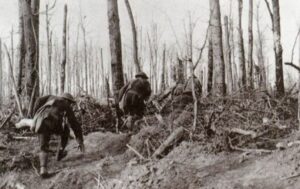
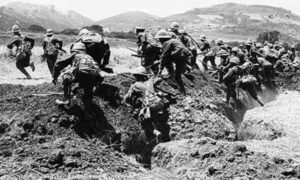 giving your all!! That is what Memorial Day is really all about…the men and women who charged the enemy, accepting their fate of almost certain death, to win the war and protect our freedoms. These men and so many like them are the heroes of this day…a fact that we must never forget. I thank every fallen soldier this day, because you gave your all…selflessly and willingly, and you will never be forgotten!!
giving your all!! That is what Memorial Day is really all about…the men and women who charged the enemy, accepting their fate of almost certain death, to win the war and protect our freedoms. These men and so many like them are the heroes of this day…a fact that we must never forget. I thank every fallen soldier this day, because you gave your all…selflessly and willingly, and you will never be forgotten!!
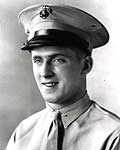 For Corporal Charles Joseph Berry, March 3, 1945 was just another day in the trenches…at least that was how it began. By days end, the war would be all over for Corporal Berry…as would his life. At this point, many people would expect that Corporal Berry would be “just another war statistic,” and they would be right, to a small degree. Corporal Berry was a war statistic, but it was the way he died that changed everything…that made him a hero!!
For Corporal Charles Joseph Berry, March 3, 1945 was just another day in the trenches…at least that was how it began. By days end, the war would be all over for Corporal Berry…as would his life. At this point, many people would expect that Corporal Berry would be “just another war statistic,” and they would be right, to a small degree. Corporal Berry was a war statistic, but it was the way he died that changed everything…that made him a hero!!
Charles Joseph Berry was born on July 10, 1923 in Lorain, Ohio, and graduated from Clearview High School in Lorain in 1941. After graduation he went to work as a truck driver for a moving company. When World War II broke out, Corporal Berry enlisted in the Marine Corps in Cleveland, Ohio, on October 1, 1941. He was 18 years old. He was sent to Parris Island, South Carolina for basic training. Following his basic training, he was stationed to the Marine Barracks at Quantico, Virginia, but shortly afterwards was ordered to the Marine Barracks, New River, North Carolina, for parachute training. He was promoted to private first class on June 2, 1942, after qualifying as a parachutist.
On March 11, 1943, PFC Berry sailed from San Diego, California, arriving later that month in New Caledonia with the 1st Parachute Battalion. He left New Caledonia in September 1943, arriving in the Solomon Islands a few weeks after his departure. Then, in October 1943, he went to Vella La Vella, where he remained for one month. In November 1943, he landed at Bougainville, and during that campaign, took part in the raid at Koairi Beach and in the Empress Augusta Bay action. Prior to returning to the United States in February 1944, he spent a short time at Guadalcanal. Following his arrival at Camp Elliott, San Diego, he joined the newly organized 5th Marine Division in early 1944. In July he departed for the Hawaiian Islands with that division. He was advanced to corporal on July 22, 1944. He landed on Iwo Jima on D-Day, February 19, 1945.
On March 3, 1945, Corporal Berry was killed during a battle that would win him the Medal of Honor. Corporal Berry while stationed in the front lines, manned his weapon with alert readiness as he maintained a constant vigil with other members of his guncrew during the hazardous night hours of March 2nd. Infiltrating Japanese soldiers launched a surprise attack shortly after midnight in an attempt to overrun his position. Corporal Berry engaged in a pitched hand-grenade duel, returning the dangerous weapons with prompt and deadly accuracy until an enemy grenade landed in the foxhole. Corporal Berry gave no thought to his own safety, but determined to save his comrades, he unhesitatingly chose to sacrifice himself and immediately dived on the deadly grenade. His body absorbed the shattering violence of the exploding charge, and protected the others from serious injury. Corporal Berry had never given it another thought. He just did it, and then it was all over. He gave his life so that his fellow marines might carry on the relentless battle against a ruthless enemy, and “his superb valor and unfaltering devotion to duty in the face of certain death reflect the highest credit upon himself and upon the United States Naval Service.”
Corporal Berry was buried in the 5th Marine Division Cemetery on Iwo Jima, but was later reinterred in Elmwood Cemetery, Lorain, Ohio, in 1948. He was honored for “conspicuous gallantry and intrepidity at the risk of his life above and beyond the call of duty” as a member of a machine-gun crew, serving with the 1st Battalion, 26th Marines, 5th Marine.
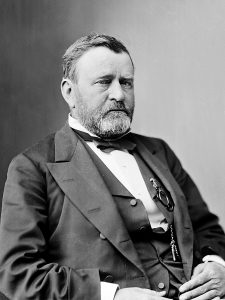 Often we think that the best course of action is to simply attack a problem head on, but that is not always true, as Union General Ulysses S. Grant would find out on June 3, 1864. The United States was deep into the Civil War, and on that particular day, and the Confederate Army was entrenched at Cold Harbor, Virginia. General Grant was about to make the greatest mistakes of his career.
Often we think that the best course of action is to simply attack a problem head on, but that is not always true, as Union General Ulysses S. Grant would find out on June 3, 1864. The United States was deep into the Civil War, and on that particular day, and the Confederate Army was entrenched at Cold Harbor, Virginia. General Grant was about to make the greatest mistakes of his career.
Since the battle began on May 31st, Grant’s Army of the Potomac and Robert E. Lee’s Army of Northern Virginia had inflicted frightful losses upon each other as they worked their way around Richmond, Virginia…from the Wilderness forest to Spotsylvania and numerous smaller battle sites…the previous month. On May 30, Lee and Grant collided  at Bethesda Church. The next day the battle began when the advance units of the armies arrived at the crossroads of Cold Harbor, which was just 10 miles from Richmond, Virginia. There, a Yankee attack seized the intersection. Grant decided that this was the perfect chance to destroy Lee at the gates of Richmond, Grant prepared for a major assault along the entire Confederate front on June 2nd, but his plan was delayed because the necessary troops…Winfield Hancock’s Union corps did not arrive on schedule, the operation was delayed until the following day.
at Bethesda Church. The next day the battle began when the advance units of the armies arrived at the crossroads of Cold Harbor, which was just 10 miles from Richmond, Virginia. There, a Yankee attack seized the intersection. Grant decided that this was the perfect chance to destroy Lee at the gates of Richmond, Grant prepared for a major assault along the entire Confederate front on June 2nd, but his plan was delayed because the necessary troops…Winfield Hancock’s Union corps did not arrive on schedule, the operation was delayed until the following day.
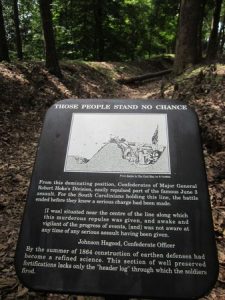
The delay was a tragic move for the Union army, because it gave Lee’s troops time to entrench. Grant was frustrated with the prolonged pursuit of Lee’s army, so he gave the order to attack on June 3, but the entrenched Confederate army had the protection of deep trenches atop a hill, making the Union army have to attack without cover. It was a decision that resulted in a complete disaster. The Yankees were met with murderous fire, and were only able to reach the Confederate trenches in a few places. The 7,000 Union casualties, compared to only 1,500 for the Confederates, were all lost in under an hour. A dejected Grant pulled out of Cold Harbor nine days later and continued to try to flank Lee’s army. His next stop was Petersburg, south of Richmond, where he forced a nine-month siege. While Petersburg would redeem him some, there would be no more attacks on the scale of Cold Harbor.
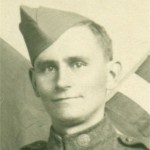 When we think of war, we usually think of planes and tanks, bombs and guns, but lately I have been wondering just what the life of a foot soldier was like. My grandfather served in World War I, and after reading a little bit about what it was like for the men in the trenches, I find myself feeling very thankful that my grandfather was a cook. I don’t know how he got that position, considering that so many soldiers were needed, and the number needed grew daily, or even hourly, I just don’t know how he was so blessed to be a cook. Grandpa Byer was always such a gentle, soft hearted man, so I have a really hard time imagining him in a position of having to kill someone. I read that when new foot soldiers came to the front, many lost their lives on the first day, because they got into the trenches, and got an overwhelming urge to peek out over the top to see if the enemy was coming. The instant they peeked over the top, a sniper’s bullet would rip through their head, killing them instantly. The commanding officers began telling the new men to keep their head down…no matter what.
When we think of war, we usually think of planes and tanks, bombs and guns, but lately I have been wondering just what the life of a foot soldier was like. My grandfather served in World War I, and after reading a little bit about what it was like for the men in the trenches, I find myself feeling very thankful that my grandfather was a cook. I don’t know how he got that position, considering that so many soldiers were needed, and the number needed grew daily, or even hourly, I just don’t know how he was so blessed to be a cook. Grandpa Byer was always such a gentle, soft hearted man, so I have a really hard time imagining him in a position of having to kill someone. I read that when new foot soldiers came to the front, many lost their lives on the first day, because they got into the trenches, and got an overwhelming urge to peek out over the top to see if the enemy was coming. The instant they peeked over the top, a sniper’s bullet would rip through their head, killing them instantly. The commanding officers began telling the new men to keep their head down…no matter what.
World War I was supposed to be a war that ended quickly, but that isn’t how it happened. Going in, it was expected that the whole thing would end after one big movement…shock and awe, I suppose, but the other side had a different idea, and the soldiers were forced to hunker down for the long haul. In the end, the war lasted from the fall of 1914 to the spring of 1918. There was movement in the beginning as the Germans marched through Belgium and France on their way to Paris, but then while the lines did advance and retreat, there was not a lot of movement until the war neared it’s end.
I can’t say that I have much insight into the ways of war, other than what I have been told or have read, but it doesn’t take much imagination to be able to picture those fear filled kids hearing the gun shots all around them, just hoping they can keep their wits about them long enough not to do something stupid that could cost them their lives. I don’t think war has changed so much in recent years either. My brother-in-law, Ron Schulenberg told me a little bit about his war experience during Operation Desert Storm. Ron was a foot soldier, and he told me about marching across the desert, stepping over the bodies of the enemy’s dead soldiers, and getting to the point where something like that no longer made him feel like he was going to be sick. For me, it is hard to imagine how much death you would have to see to put you in a place of being able to just step over a dead body and march on.
Almost every war has it boots on the ground part. They are often the first soldiers in the war, and they have to 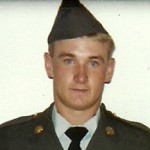 pave the way for those who will follow. They are a tough, almost street smart…or is it trench smart…soldier, who knows what to expect from guerilla warfare, or at least as much as anyone can know what to expect before they go to war. It occurs to me that a soldier going into a war is a completely different person than a soldier coming out of a tour of duty. You simply can’t spend time around all that death, not knowing if you will ever leave that place, and not be completely changed by it. No wonder so many of our soldiers come out of their tour of duty with Post Traumatic Stress Disorder. These men came into the war as kids, and came out feeling like old men. That is not the way they imagined their post high school years, but when you are serving your country, your high school/boyhood ideas have to be set aside to make way for the skills and mindset you must have to survive the life of a foot soldier.
pave the way for those who will follow. They are a tough, almost street smart…or is it trench smart…soldier, who knows what to expect from guerilla warfare, or at least as much as anyone can know what to expect before they go to war. It occurs to me that a soldier going into a war is a completely different person than a soldier coming out of a tour of duty. You simply can’t spend time around all that death, not knowing if you will ever leave that place, and not be completely changed by it. No wonder so many of our soldiers come out of their tour of duty with Post Traumatic Stress Disorder. These men came into the war as kids, and came out feeling like old men. That is not the way they imagined their post high school years, but when you are serving your country, your high school/boyhood ideas have to be set aside to make way for the skills and mindset you must have to survive the life of a foot soldier.

